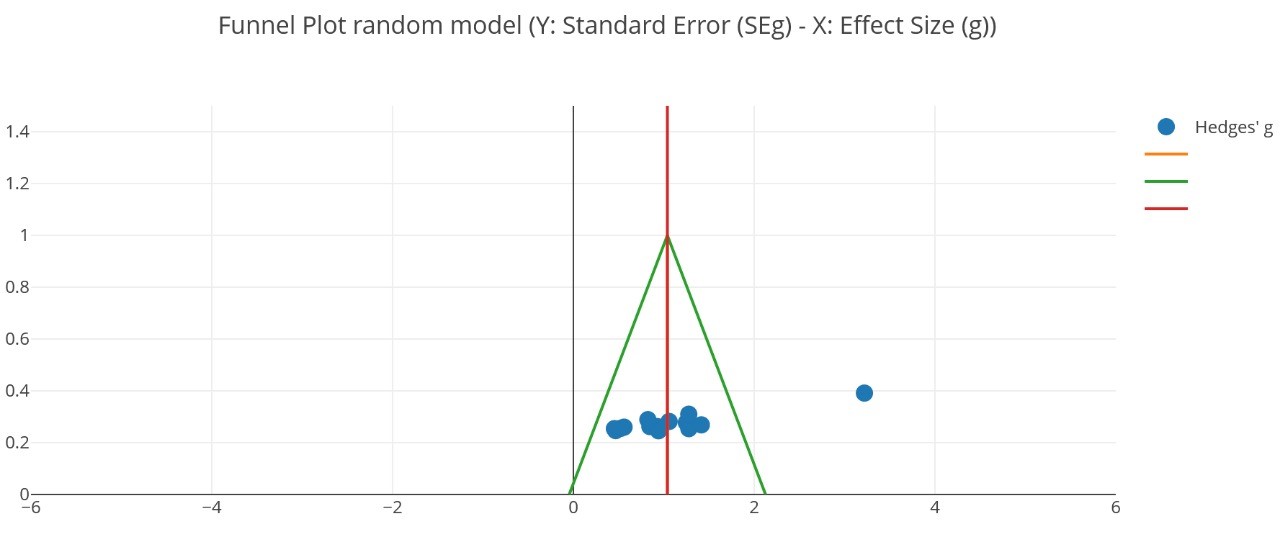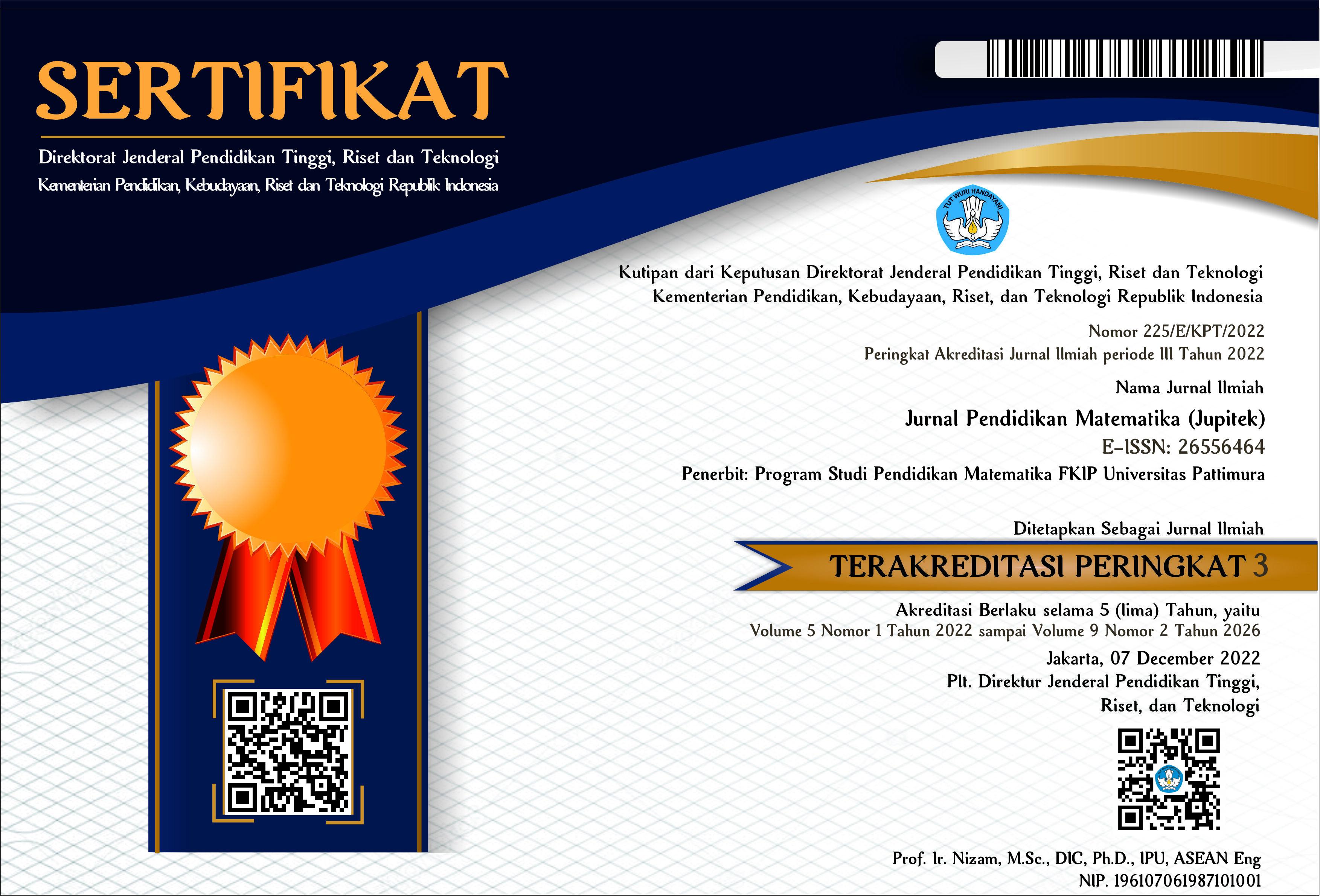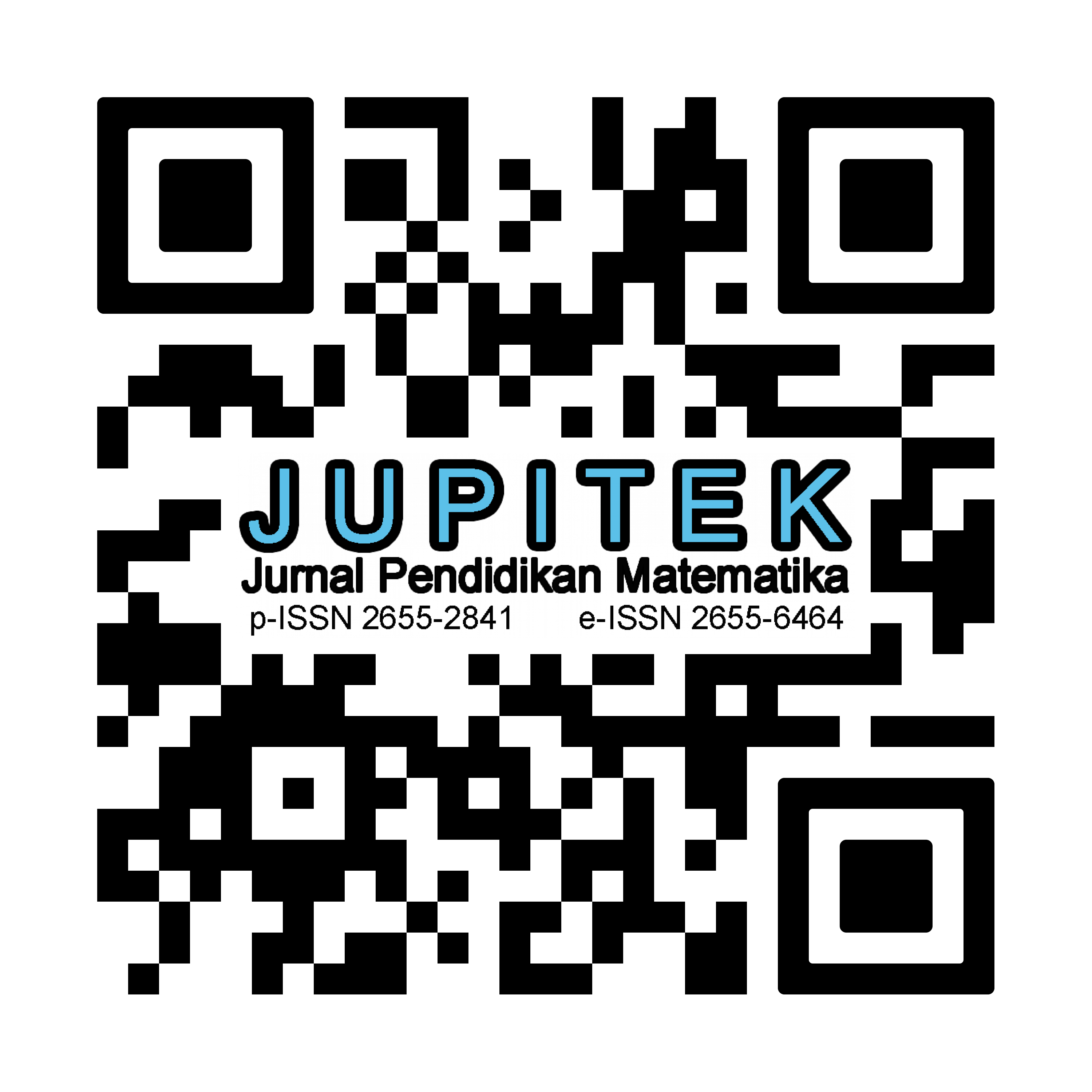THE INFLUENCE OF ETHNOMATHEMATICS BASED LEARNING ON MATHEMATICS PROBLEM-SOLVING ABILITY: A META-ANALYSIS
Abstract
The introducer of ethnomathematics defined ethnomathematics as mathematics practised among identified cultural groups. Ethnomathematics positively impacts the learning process either as a Moderate or an approach to, for example, problem-solving ability. Previous researchers have carried out several studies on implementing ethnomathematical-based learning to improve students’ problem-solving ability. However, the analysis shown is very varied, so it still raises doubts about the impact of learning using ethnomathematics on mathematical problem-solving abilities. This study aims to determine the correlation between ethnomathematical-based with students’ problem-solving skills. This study uses meta-analysis research, which combines several experimental Studies that collate the effectuality of ethnomathematical-based learning and regular instruction on improving the mathematical problem-solving ability. Relevant studies were searched through e-resources from Perpusnas databases with the specified keywords. There are 106 studies obtained from the search query. Fourteen studies were selected according to the inclusion and exclusion criteria. Meta-Mar was used to determine the joined effect size by analysing the selected studies. This study shows that the joined effect size of applied ethnomathematical-based learning in improving mathematical problem-solving skills is 1,04 and was classified as a strong effect. Therefore, it is deduced that ethnomathematical-based learning relies on mathematical problem-solving abilities. Statistically, the implementation of ethnomathematics-based learning in improving mathematical problem-solving ability is also influenced by the study’s characteristics at the level of education.
Downloads
References
Abdullah, D. I., Mastur, Z., & Sutarto, H. (2015). Keefektifan Model Pembelajaran Problem Based Learning Bernuansa Etnomatematika terhadap Kemampuan Pemecahan Masalah Siswa Kelas VIII. Unnes Journal of Mathematics Education, 4(3).
Aisyah, S., & Usdiyana, D. (2022). A meta analysis study: Is Problem Based Learning (PBL) effective toward students’ mathematical connections ability? Journal of Physics: Conference Series, 2157(1). https://doi.org/10.1088/1742-6596/2157/1/012036
Aprilyani, N., & Hakim, A. R. (2020). Pengaruh Pembelajaran Assurance, Relevance, Interest, Assessment, Satisfaction Berbantuan Etnomatematika terhadap Kemampuan Pemecahan Masalah. JNPM (Jurnal Nasional Pendidikan Matematika), 4(1), 61. https://doi.org/10.33603/jnpm.v4i1.2549
Astutiningtyas, E. L., Wulandari, A. A., & Farahsanti, I. (2017). Etnomatematika Dan Pemecahan Masalah Kombinatorik. Jurnal Math Educator Nusantara (JMEN), 03(76).
Borenstein, M., Hedges, L. V, Higgins, J. P. T., & Rothstein, H. R. (2010). A Basic Introduction to Fixed-Effect and Random-Effects Models for Meta-Analysis. Research Synthesis Methods, 1(2), 97–111. https://doi.org/https://doi.org/10.1002/jrsm.12
Coe, R. (2002). It’s the Effect Size, Stupid - What effect size is and why it is important. The British Educational Research Association Annual Conference, 1–16. Exeter: University of Durham.
Cohen, L., Manion, L., & Morrison, K. (2007). Research Methods in Education. In Research Methods in Education (13th ed.). New York: Routledge.
Hamidah, H., Junaedi, I., Mulyono, M., & Kusuma, J. W. (2021). Kurikulum dan Pembelajaran Matematika di Jepang dan di Indonesia. Jurnal Pendidikan Matematika (JPM), 7(2), 95. https://doi.org/10.33474/jpm.v7i2.11425
Hidayati, R., & Restapaty, R. (2019). Efektivitas Model Problem Based Learning Berbasis Etnomatematika Motif Kain Sasirangan Terhadap Kemampuan Pemecahan Masalah. SENPIKA II (Seminar Nasional Pendidikan Matematika), 41-49.
Irawan, A., Kencanawaty, G., & Febriyanti, C. (2018). Realistic mathematics and ethnomathematics in improving problem solving abilities. Journal of Physics: Conference Series, 1114(1). https://doi.org/10.1088/1742-6596/1114/1/012108
Kurniawati, D., Sutiarso, S., & Widyastuti. (2018). Efektivitas Model Pembelajaran Inkuiri Berbasis Ethnomathematics Terhadap Kemampuan Pemecahan Masalah Matematis Siswa. Jurnal Pendidikan Matematika Unila, 6, 293–304.
Lubis, A. N. M. T., & Widada, W. (2020). Kemampuan Problem Solving Siswa melalui Model Pembelajaran Matematika Realistik Berorientasi Etnomatematika Bengkulu. Jurnal Pendidikan Matematika Raflesia, 5(1), 127–133.
Maulana, G., Junaedi, I., I, S. D. N. C., & Barat, J. (2020). Pattern of Problem Solving Skill Reviewed Based on Student Cognitive Style After Experienced Problem Based Learning Model With Ethnomathematics Nuances. Journal of Primary Education, 9(2), 209–219.
Moher, D., Liberati, A., Tetzlaff, J., & Altman, D. G. (2009). Preferred Reporting Items for Systematic Reviews and Meta-analyses: the PRISMA Statement. Journal of Clinical Epidemiology, 62(10), 1006–1012. https://doi.org/10.1016/j.jclinepi.2009.06.005
NCTM. (2000). Principles and Standards for School Mathematics. Amerika: Key Curriculum Press.
Nisrina, H., Agustin, D. S. R., & Mahmudah, U. (2021). Etnomatematika: Analisis Problem Solving pada Mata Kuliah Program Linier berbasis Kearifan Lokal. JMPM: Jurnal Matematika Dan Pendidikan, 6(1), 72–80.
Nofitasari, L., & Zaenuri Mastur, M. (2016). Keefektifan Model Pembelajaran Tutor Sebaya Bernuansa Etnomatematika Terhadap Kemampuan Pemecahan Masalah Peserta Didik Pada Materi Segiempat. Unnes Journal Of Mathematics Education, 5(1).
Nugroho, A. A., Dwijayanti, I., & Atmoko, P. Y. (2020). Pengaruh Model Pembelajaran Berbasis Penemuan dan Lingkungan terhadap Kemampuan Pemecahan Masalah Matematika Melalui Meta Analisis. AKSIOMA: Jurnal Program Studi Pendidikan Matematika, 9(1), 147. https://doi.org/10.24127/ajpm.v9i1.2659
Nur, A. S., Waluya, S. B., Rochmad, R., & Wardono, W. (2020). Contextual learning with Ethnomathematics in enhancing the problem solving based on thinking levels. JRAMathEdu (Journal of Research and Advances in Mathematics Education), 5(3), 331–344. https://doi.org/10.23917/jramathedu.v5i3.11679
Oktovianus, T. M. (2021). Meta-Analysis of Ethnomatematic Characteristics and Their Effects on Student Learning Outcomes. Ganesha University of Education.
Paloloang, M. F. B., Juandi, D., Tamur, M., Paloloang, B., & Adem, A. M. G. (2020). Meta Analisis : Pengaruh Problem-Based Learning terhadap Kemampuan Literasi Matematis Siswa di Indonesia Tujuh Tahun Terakhir. AKSIOMA: Jurnal Program Studi Pendidikan Matematika, 9(4), 851–864.
Prabawa, E. A., & Zaenuri. (2017). Unnes Journal of Mathematics Education Research Analisis Kemampuan Pemecahan Masalah Ditinjau Dari Gaya Kognitif Siswa pada Model Project Based Learning Bernuansa Etnomatematika. Ujmer, 6(1), 120–129.
Priola, E. J. (2016). Managerial Communication Competencies That Enhance Employee Performance: A Systematic Review. University of Maryland University College.
Prisha Bahri, S., Zaenuri, & Sukestiyarno, Y. (2018). Problem Solving Ability on Independent Learning and Problem Based Learning with Based Modules Ethnomatematics Nuance. Unnes Journal of Mathematics Education Research, 7(2), 218–224.
Priska, V. H., & Mawardi. (2021). Meta Analisis Efektivitas Model Pembelajaran Problem Solving dan Problem Posing Ditinjau dari Kemampuan Berpikir Kritis Siswa. Jurnal Educatio, 7(1), 220–227. https://doi.org/10.31949/educatio.v7i1.928
Retnawati, H., Apino, E., Kartianom, Djidu, H., & Anazifa, R. D. (2018). Pengantar Analisis Meta. Yogyakarta: Parama Publishing.
RI, K. (2016). Silabus Mata Pelajaran Sekolah Menengah Atas/Madrash Aliyah/Sekolah Menengah Kejuruan/Madrasah Aliyah Kejuan (SMA/MA/SMK/MAK). In Http://Kemdikbud.Go.Id/ (Vol. 57946100). Retrieved from http://kemdikbud.go.id/main/?lang=id
Safaria, S. A., Reski, A., & Patih, T. (2021). Studi Meta-Analisis Kemampuan Pemecahan Masalah Matematika. Kulidawa, 1(2), 14–21.
Tamur, M., Juandi, D., & Kusumah, Y. S. (2020). The Effectiveness of the Application of Mathematical Software in Indonesia; A Meta-Analysis Study. International Journal of Instruction, 13(4), 867–884. https://doi.org/10.29333/iji.2020.13453a
Tungga, M. O. (2021). Meta-Analisis Karakteristik Etnomatematika Dan Pengaruhnya Pada Hasil Belajar Siswa. Universitas Pendidikan Ganesha
Valentine, J. C., Hedges, L. V., & Cooper, H. M. (2009). Handbook of Research Synthesis and Meta-Analysis 2nd Edition. New York: Russell Sage Foundation.
Yanti, D., Widada, W., & Zamzaili. (2018). Kemampuan Pemecahan Masalah Open Ended Peserta Didik Sekolah Negeri Dan Swasta Dalam Pembelajaran Matematika Realistik Berorientasi Etnomatematika Bengkulu. Jurnal Pendidikan Matematika Raflesia, 3(1), 203–209. https://doi.org/https://doi.org/10.31186/jpmr.v3i1.6284
Yunitasari, R., & Zaenuri. (2020). Kemampuan Pemecahan Masalah Matematis dan Self Efficacy Siswa SMP Negeri 1 Cepiring Kelas VIII Pada Pembelajaran PBL Bernuansa Etnomatematika. PRISMA:Prosiding Seminar Nasional Matematika 3, 3, 426–434.
Yustinaningrum, B. (2021). Meta-Analisis: Pengaruh Model Problem Based Learning terhadap Kemampuan Pemecahan Masalah Matematis. Jurnal Padegogik, 4(2), 13–22. https://doi.org/https://doi.org/10.35974/jpd.v4i2.2519 Meta
Zaenuri, & Dwidayati, N. (2018). Menggali Etnomatematika: Matematika sebagai Produk Budaya. PRISMA, Prosiding Seminar Nasional Matematika, 1(1), 471–476. Retrieved from https://journal.unnes.ac.id/sju/index.php/prisma/

Copyright (c) 2022 Sri Apriatni, Syamsuri Syamsuri, Hepsi Nindiasari, Sukirwan Sukirwan

This work is licensed under a Creative Commons Attribution-NonCommercial-ShareAlike 4.0 International License.
License and Copyright Agreement
By submitting a manuscript to Jurnal Pendidikan Matematika (JUPITEK), the author(s) certify and agree to the following terms:
- Originality and Authority: The submitting author is authorized by all co-authors to enter into this agreement. The manuscript describes original work that has not been published previously in a peer-reviewed journal, nor is it under consideration for publication elsewhere.
- Approval: Its publication has been approved by all author(s) and by the responsible authorities of the institutions where the work was carried out.
- Rights: The authors secure the right to reproduce any material that has already been published or copyrighted elsewhere.
- Licensing and Copyright: Authors retain the copyright to their work.
- License Grant: The authors grant Jurnal Pendidikan Matematika (JUPITEK) the right of first publication, with the work simultaneously licensed under the Creative Commons Attribution-NonCommercial-ShareAlike 4.0 International (CC BY-NC-SA 4.0).
- Self-Archiving: Authors are permitted and encouraged to deposit the published version of their article in institutional repositories, on their personal websites, and other academic platforms, with proper acknowledgment of its initial publication in Jurnal Pendidikan Matematika (JUPITEK).





.png)


